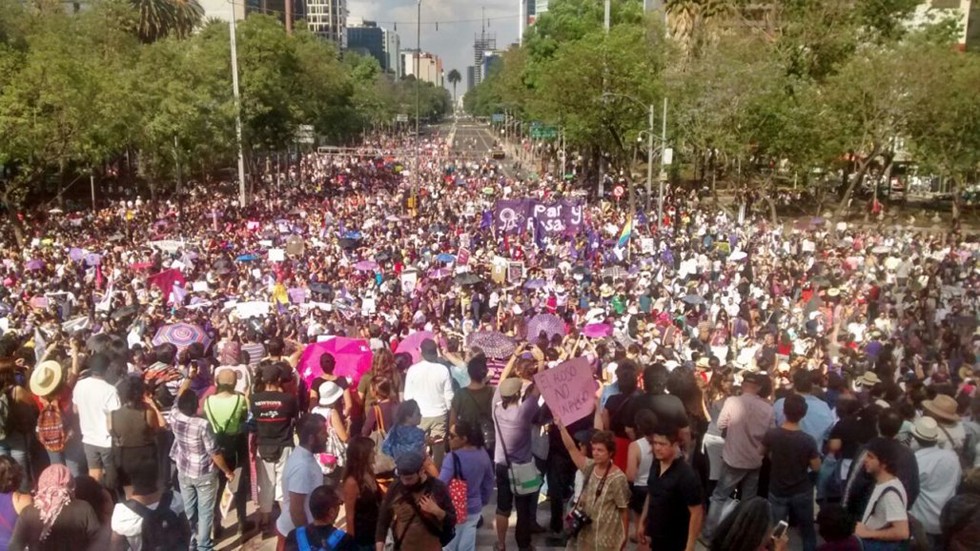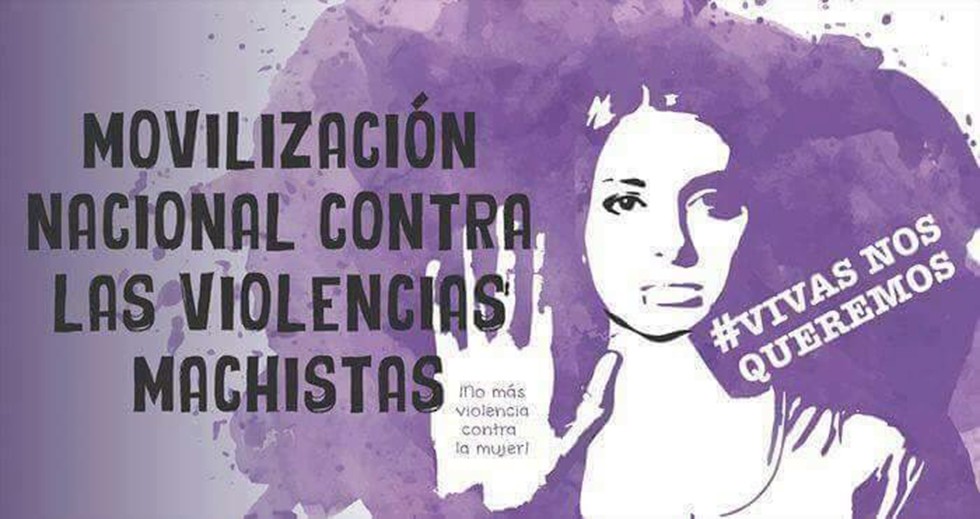Filed under: Announcement, Anti-Patriarchy, Mexico

On April 24th (#24A), feminists are calling, once more and for the second consecutive year, for a “Violet Spring,” a national mobilization against sexist violence, from their own spaces and in all public spaces to “denounce the femicidal state, who is complicit in the deaths of womxn, and which is condoned by public officials, who instead of protecting and providing a voice for the voiceless, always favor the macho aggressors.” This call was made through social media, where the call was launched.
In Mexico City, the demonstration will leave at 5PM from Victoria Alada towards the Zócalo. In the State of Mexico, the march is taking place at 4:30 in Ecatepec on the esplanade of the municipal palace of San Cristobal Centro. Also, there is an invitation to Metro Feminista Universidad at 12 PM and to the feminist brigade in Guadalajara.
There is concern about growing violence against womxn and the alarming number of femicides. According to the National Citizen Observatory of Femicide (OCNF), in Mexico, there are an average of 7 womxn murdered per day. The OCNF reports that between 2012 and 2013, 3,892 womxn were killed, showing signs of torture, physical and/or sexual violence. 7,185, at least up to September 2015, remained disappeared according to the National Registry of Data of Missing or Missing Persons. 63% of womxn over the age of 15 claim to have been victims of some kind of violence or sexual abuse.
The Call:
The National Mobilization against Machista Violence is an initiative of several feminist compañeras from all parts of Mexico, in the face of gender violence that has been increasing along with the precariousness of life, neoliberal policies, and the participation of the state in the violence of organized crime. We are moved by the rage and indignation we feel against all the machista and femicidal violence which we all survive under, every day.
On April 24, womxn workers, indigenous womxn, young womxn, students, sex workers, domestic workers, artists, lesbians, bisexuals, trans womxn, mothers, womxn of all ages, will go out into the streets to say we are sick and tired that in this country, 7 womxn are killed daily with complete impunity.
Femicides are just the tip of the iceberg of the structural violence that womxn experience in several different ways in this country: precarious working conditions, which force us to leave our homes early in the morning or to return very late; silence or invisible violence within the family structure; the poverty of indigenous womxn and the dispossession of their land, due to private investment; the imminent risk of sexual violence against migrant womxn; revictimization and lack of access to “justice”; the criminalization of abortion and the criminalization of womxn who abort; the objectification of womxn in mass media and sexist advertising; intimidation and sexual harassment in schools and workplaces; little or no access to health services; obstetric violence; the permissiveness and neglect of sexual violence in the streets, such as street harassment; trafficking for the purpose of sexual exploitation of womxn and girls, among many others.
It is because of the neglect and complicity of the Mexican state in the face of all this violence towards womxn that we occupy the streets, a space that is ours and that we will reclaim as a battlefield, as many times as necessary, to demonstrate that womxn can organize. We are many and we are strong. We will never tolerate any kind of sexist violence because #VivasNosQueremos.
18 cities in Mexico will join the different actions this April 24; the day that marks the 10th anniversary of the decriminalization of abortion in Mexico City. According to reports by the National Institute of Statistics and Geography (INEGI), there are five murders of womxn on average per day, 28,710 between 2000 and 2015, and 110 womxn have been killed in the municipality of Ecatepec during the year 2013-2014.
Cities:
Aguascalientes, Aguascalientes. Chihuahua, Chihuahua. Chilpancingo, Guerrero. CDMX-EDOMEX. Guadalajara, Jalisco. Ciudad Obregón, Sonora. Ensenada, Baja California. Hermosillo, Sonora. Mérida, Yucatán. Matamoros, Tamaulipas. Morelia, Michoacán. Oaxaca de Juárez, Oaxaca. Pachuca, Hidalgo. Torreón, Coahuila. Tijuana, Baja California. Tepic, Nayarit. Tuxtla Gutiérrez, Chiapas y Valladolid, Yucatán.






